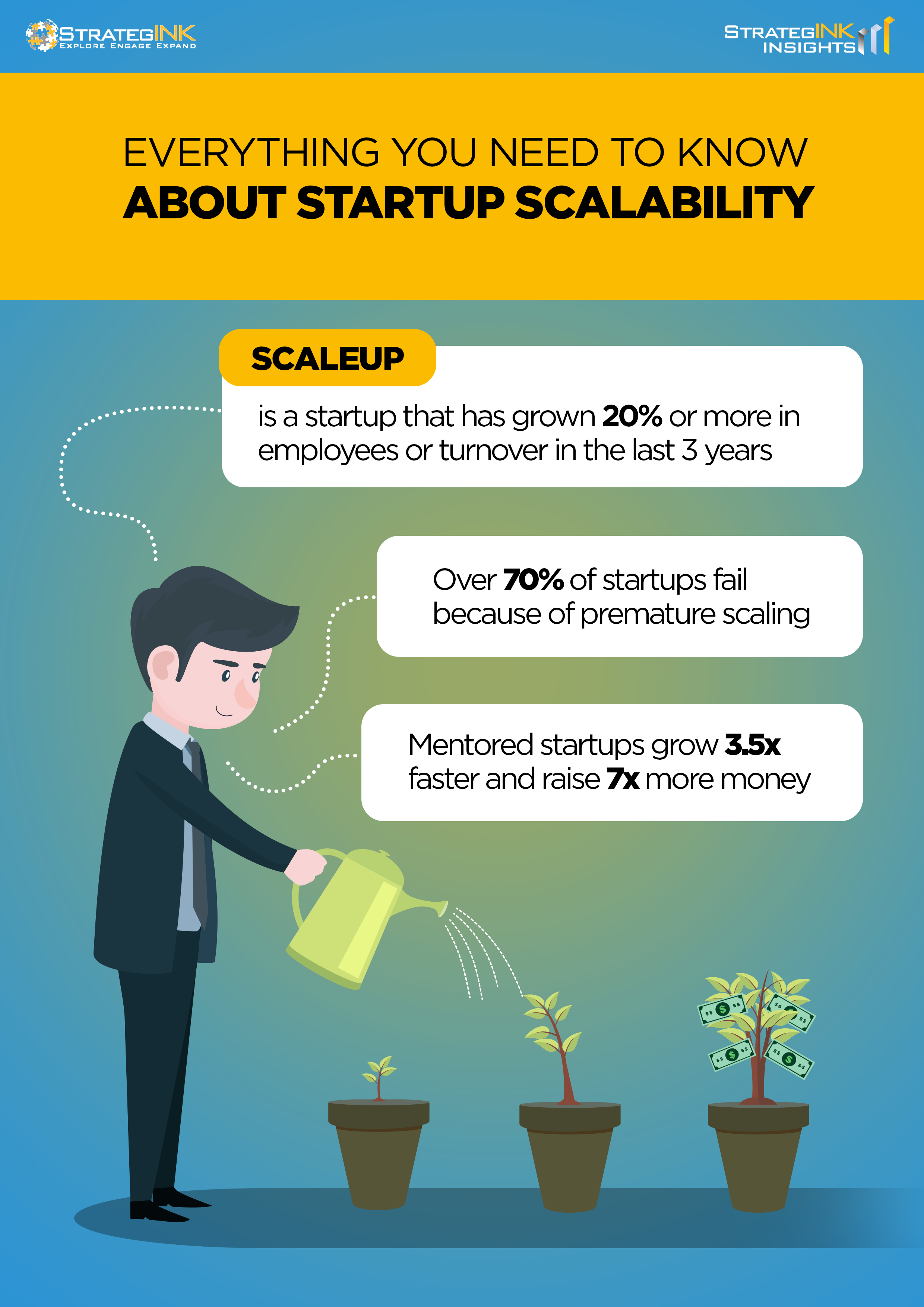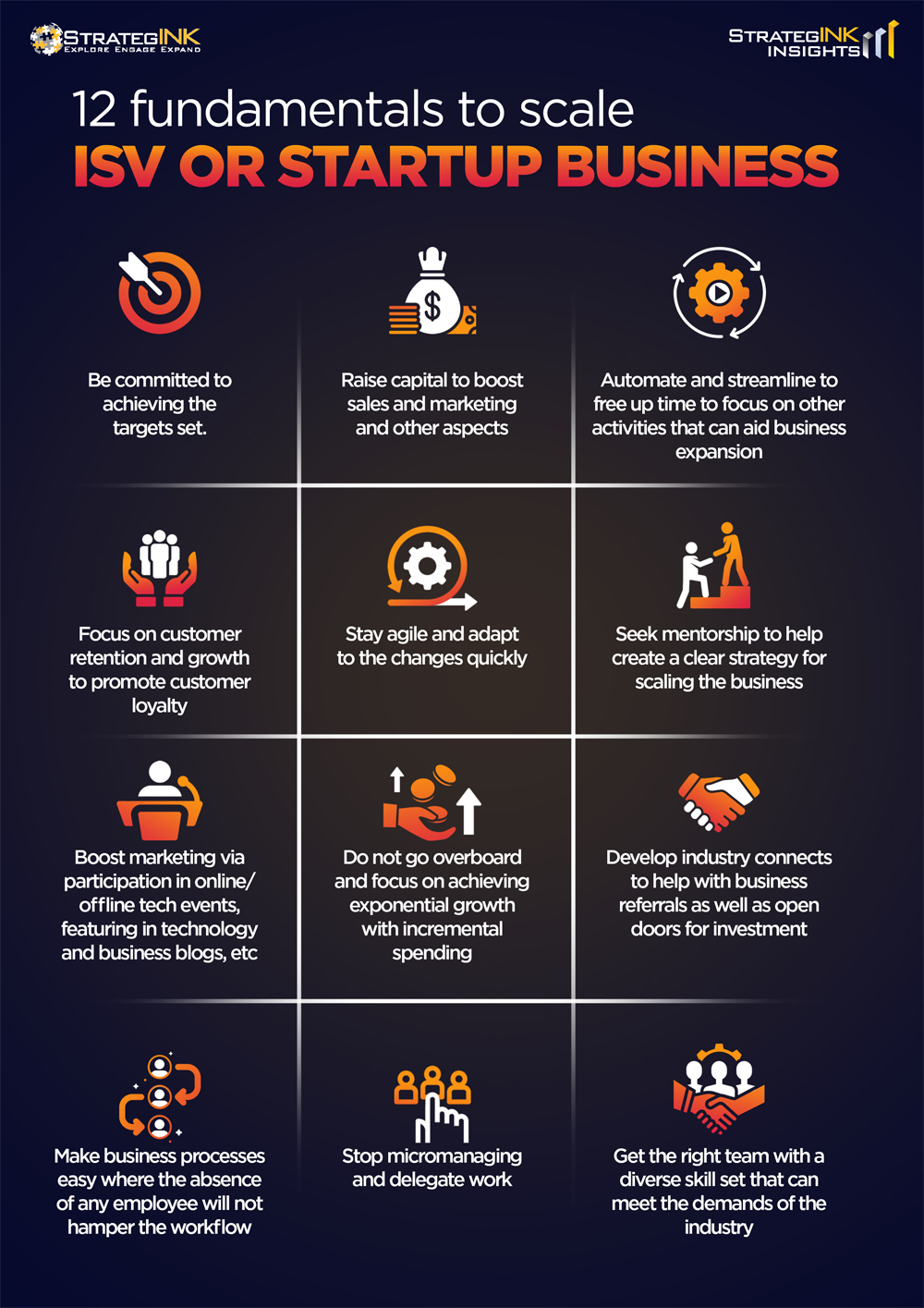
Points in focus
- Having an effective marketing strategy is the quickest way for startups to scale
- Scaling a startup requires a focus on all aspects of the business across hiring, funding, geographical expansion etc.
- It is important to have a robust GTM strategy and predictable stream to facilitate scalability
- Scale up global and local should reflect commitment, agility, industry connects to ensure sustainable scalability s
Establishing a startup is all about getting an idea off the ground and proving your business model. Scaling up involves accelerating the growth and revenue once the product is already established in the market. Once a functional business is established, it is time for the founders to plan for the next phase of the development of the company. As a company grows so do its challenges. When planning to scale up, ISVs and startup founders are faced with confusing options on hiring, team size, funding, expansion, acquisition, etc. Scale-up differs from growth, while growth is more about making the business larger, scale-up focuses on increasing the business while keeping the costs low.

| Click to enlarge |
Things to consider before scaling
Scaling up too quickly or too slowly can both pose a risk to the growth of an organization. On one hand, recklessly scaling up can cause organizational issues and whereas scaling slowly can lead to missed opportunities. Scaling up is a strategic decision and founders need to consider the following before embarking on this journey.
Product-market fit
Before thinking of scaling the ISV or a startup, the company should evaluate whether or not they have achieved product-market fit. This means that the right product is being sold to the right audience. The product’s demand needs to be validated before scaling the business. Achieving the right product-market fit leads to long-term customers and drives business growth. 42% of start-ups fail due to no product demand.
Predictable revenue stream
A steady flow of revenue and a predictable sales pipeline are important for scaling a business. Early-stage ISVs and startups generally have limited resources and revenue uncertainty. This can inhibit long-term planning in terms of budgeting, hiring resources, and other expansion planning. Organizations should have the necessary resources for scaling so that they do not run out of money while scaling up the business. Predictable revenue is also crucial for attracting potential investors required for scaling up a business.
12 fundamentals to scale ISV or startup business rapidly in India & overseas
There is no clear-cut path or a one size fits all approach when it comes to scaling an ISV or a startup business. Here are a few tips that can help make the scale-up journey smoother and less stressful.

| Click to enlarge |
Setting up a business requires a lot of hard work, patience, and the ability to rise in the face of multiple failures. The next step i.e. scaling the business can be another long and arduous journey. The first step is to truly desire to scale the startup business, envision a realistic growth plan, and remain committed to achieving the targets set.
Raise capital
Scaling the startup within the country and overseas requires capital. Funds are needed to boost sales and marketing, hire the best talent, enter new markets, further improve the product, etc.
Founders need to assess how much money they need and all the options to raise it. Less than 1% of startups get investment capital. Banks, angel investors, or VC firms are some of the options for raising funds. Founders also need to decide how much equity they are willing to divest for getting the required funding.
Automate and streamline
Any process that is manual or labor-intensive hampers the ability of a startup to scale. Automating repeated processes such as payroll, billing, training new hires, etc can free up time to focus on other activities that can aid business expansion. Though automating numerous processes can be time-consuming initially, this one-time activity will help streamline processes helping achieve scale. Things that cannot be automated should be outsourced as far as possible. Only the essential roles should be in-house, and the other non-core functions should be outsourced. These steps will help improve operational efficiencies.
Focus on customer retention and growth
Customer acquisition and customer retention are both important for a startup to scale. Customer retention lowers customer acquisition costs and helps build a predictable revenue stream. In subscription-based businesses, customer loyalty leads to increased subscription renewals. Customer service and customer satisfaction should be improved to retain customers in the long run. Actually listening to the needs and any issues faced by the customers and addressing them promptly will lead to loyal customers of the brand.
Stay agile
There will be times when the scale-up will not go as per the plan envisioned. In the rapidly changing business scenario, the founders should be ready to adapt to the changes quickly. This will help the business stay relevant and be resistant to unforeseen events.
Seek mentorship
The experience, skills, knowledge, and connections that mentors bring can aid the growth and development of a business. Mentorship helps in making the right decisions the first time saving time and money. When looking for a mentor, startups should look for someone visionary and a problem solver. Also, the close working relationship the founders will have with the mentor requires both of them to have good chemistry. Lastly, a mentor from the same industry vertical as the startup will be able to provide better business inputs and help create a clear strategy for scaling the business.
Boost marketing
For a startup to scale, people should know about its products and services. Marketing is needed to attract new customers as well as retain existing customers. By engaging with potential and existing customers, marketing teams can improve customer satisfaction leading to more business for a start-up. This can be quite helpful when startups are looking to scale their business and especially when looking to enter new markets. Different avenues of marketing such as participation in online/offline tech events, featuring in technology and business blogs, etc can boost marketing.
Do not go overboard
When scaling up, startups should show restraint in hiring and spending. Scaling up requires hiring more resources to manage the expanding business operations. Startups should be judicious in recruitment as well as the termination of employment. Hiring a large number of people with high remuneration can be detrimental to business growth. Similarly, adopting a hire and fire policy can lead to an unfavorable image of the brand. When scaling the business, ISVs and startups should try to stay lean and avoid unnecessary expenditure. The focus should be on achieving exponential growth with incremental spending.
Develop industry connects
Having strong business connections in the industry where the startup operates can be quite beneficial. Industry connections can help with business referrals as well as open doors for investment. Industry leaders can help early-stage startups scale by investing in them or having them as a part of the various technology incubation programs they have. Events, panel discussions, conferences, etc can help forge industry connections.
Make business processes easy
The business processes should be simple, easy to understand, and repeatable. The business should be capable of running without being dependent on 1 to 2 individuals. This way the absence of any employee will not hamper the workflow.
Stop micromanaging
Micromanagement not only distracts the founding team from focusing on other important tasks but can also make employees feel uncomfortable. The employees will feel that they are constantly under scrutiny and they are not trustworthy enough to do their jobs without micromanaging. Delegating work as the company and team size grows is important. Not every founder can be an expert in all the aspects of the business and the experts hired for particular business processes should be allowed to manage their work.
Get the right team
The right team can make or break a business. The team members should actively work on increasing customer acquisition, and customer retention, generating more business and working on the overall growth of the company. The team should have a diverse skill set that can meet the demands of the industry. Apart from the talent, the team members should also have the right mindset and the drive to grow the company. The company culture should be welcoming and encourage business growth. Unmotivated employees can do more damage to the company than the business they bring in.
Scale up with the right GTM strategy
Transitioning from a startup to a scaleup phase for any ISV or SaaS business requires an effective GTM or Go To Market strategy which focuses on how scalability can be realized. It goes beyond simple marketing efforts, and focuses on establishing a thriving visibility and presence across platforms visibility, forming meaningful collaborations and achieving robust market activation. Having the right partners like StrategINK on board can help traverse this journey seamlessly.





